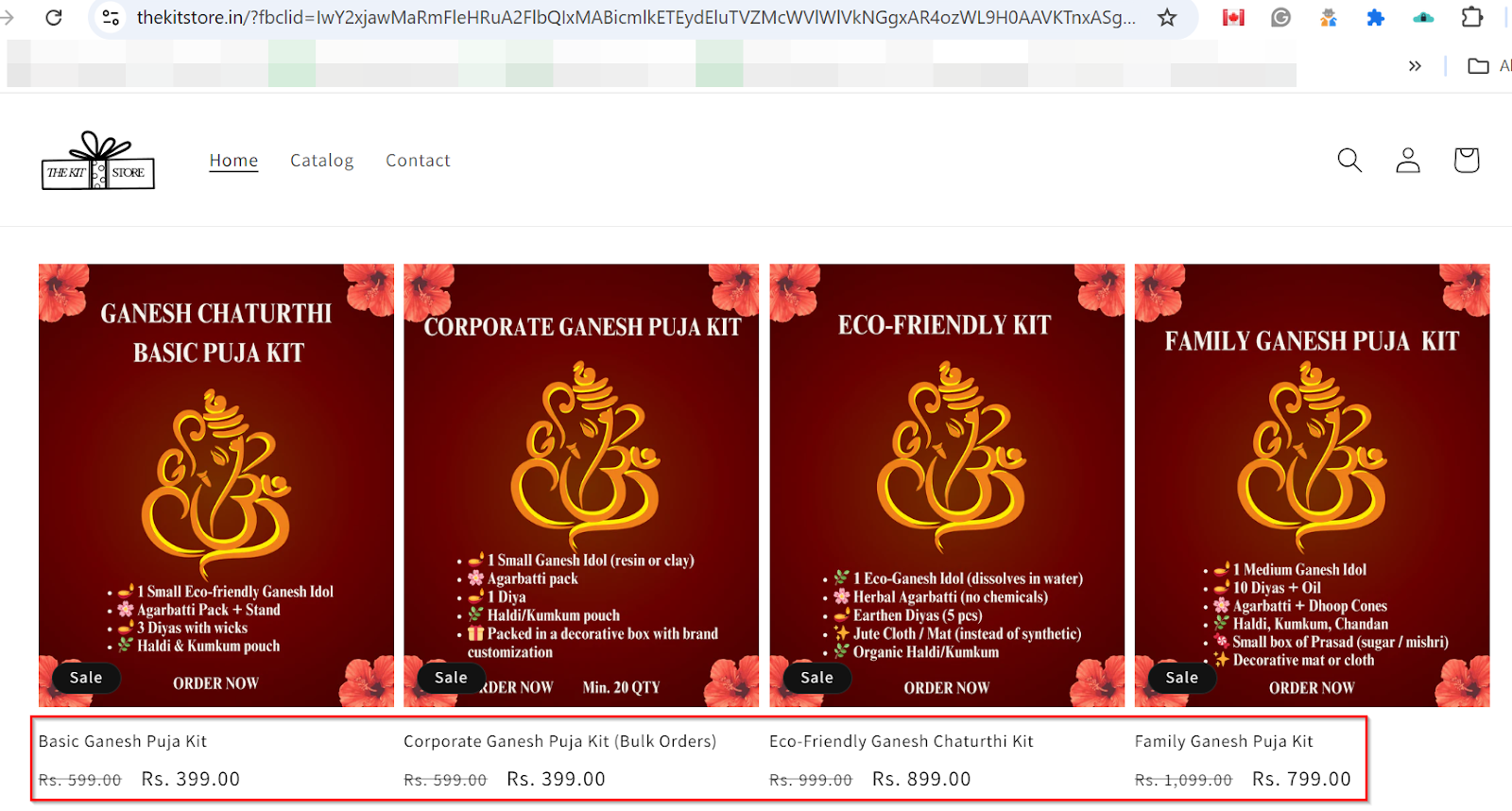🚀 أصبحت CloudSek أول شركة للأمن السيبراني من أصل هندي تتلقى استثمارات منها ولاية أمريكية صندوق
اقرأ المزيد




غانيش شاتورثي، المعروف أيضًا باسم فيناياكا تشاتورثي، هي واحدة من أكثر مهرجانات الهند حيوية واحتفالاً على نطاق واسع. من الأصنام الصديقة للبيئة المصممة بشكل جميل إلى الباندا المجتمعية الكبيرة، يعد المهرجان مزيجًا من التفاني والفن والثقافة والوحدة. ومع ذلك، بينما يستعد الملايين من المصلين للترحيب باللورد غانيشا، يستعد مجرمو الإنترنت والمحتالون أيضًا - ليس للاحتفال، ولكن للاستغلال.
في كل عام، تتزايد عمليات الاحتيال خلال المهرجانات الكبرى، ولا يُستثنى من ذلك غانيش تشاتورثي. يعرف المحتالون أن الناس عاطفيون وسخيون وغالبًا ما يكونون أقل حذرًا خلال أوقات الأعياد. في هذه المدونة، سنستكشف الحيل الأكثر شيوعًا حول غانيش شاتورثي، وكيفية عملها، وما يمكنك القيام به لحماية نفسك وأحبائك.
مع تزايد الطلب على أصنام غانيش الصديقة للبيئة، يفضل العديد من المصلين شرائها عبر الإنترنت. لسوء الحظ، يقوم المحتالون بإنشاء مواقع ويب مزيفة أو صفحات Instagram أو مجموعات WhatsApp تبدو شرعية. إنهم ينشرون صورًا جذابة لأصنام الصلصال، ويقدمون خصومات كبيرة، ويجذبون الناس إلى الدفع مقدمًا. بمجرد إجراء الدفع، يتم تسليم آيدول دون المستوى المطلوب - أو لا يصل أي شيء على الإطلاق.
حددنا موقعًا مشبوهًا يعلن عن أصنام Ganesh Chaturthi بخصم 25٪. عند التحقق من صفحة Facebook المرتبطة بها، لاحظنا أنها تم إنشاؤها مؤخرًا وتعيد توجيه الزوار مباشرة إلى WhatsApp Messenger. هذا يرفع الأعلام الحمراء، لأنه يوفر للمحتالين طريقة سهلة للانخراط في الهندسة الاجتماعية ضد المصلين الذين يبحثون عن الأصنام.

يقوم المحتالون بتوزيع رسائل مثل «تهانينا! لقد فزت بجائزة غانيش شاتورثي بقيمة 10,000 دولار» أو «هدايا حصرية للمحبين هذا العام.» للمطالبة بالجائزة، يُطلب من الضحايا مشاركة التفاصيل الشخصية أو دفع رسوم معالجة صغيرة. في الواقع، لا توجد جائزة - فقط الأموال المسروقة أو البيانات المسربة.
يتم الترويج لليانصيب الذي يحمل عنوان Ganesh Chaturthi، مدعيًا أن المشاركين لديهم فرصة للفوز بجائزة كبرى قدرها 3 كرور روبية.

أنشأ المجرمون متاجر وهمية على الإنترنت تبيع أصنام غانيش أو مجموعات بوجا أو الحلويات أو الهدايا بأسعار لا يمكن تصديقها. غالبًا ما تحاكي مواقع النسخ هذه العلامات التجارية الحقيقية ولكن بها أخطاء إملائية أو عناوين URL غريبة. عند إدخال تفاصيل الدفع أو البطاقة، تذهب الأموال مباشرة إلى المحتالين وتتم سرقة معلوماتك. بمجرد أن يقوم الضحايا «بإدخال تفاصيل الدفع الخاصة بهم... تتم إعادة توجيه الدفعة بالكامل إلى المحتالين بالإضافة إلى المعلومات المصرفية».
يستخدم الإعلان الدعائي قالب مجموعة بوجا الأساسية من غانيش تشاتورثي لجذب الضحايا وإعادة توجيههم إلى موقع ويب يتحكم فيه المخادعون.

تم إنشاء صفحة Instagram التي تعرض هذه الإعلانات الدعائية مؤخرًا فقط وليس لها أي إعجابات - وهي علامة حمراء واضحة للمستخدمين.

يعيد الإعلان توجيه المستخدمين إلى موقع ويب احتيالي - https://thekitstore.in - والتي تحاكي منصة التجارة الإلكترونية الشرعية ولكنها مصممة لخداع الزوار والاحتيال عليهم.

هناك صفحة احتيالية أخرى على Instagram تعلن عن سماعات JBL وأنظمة المسرح المنزلي بأسعار منخفضة بشكل لا يصدق - 129 دولارًا و 99 دولارًا - متنكرًا في صورة عرض Ganesh Chaturthi. تسيء الصفحة أيضًا استخدام الشعار واسم العلامة التجارية لمنصة التجارة الإلكترونية الرئيسية لانتحال الأصالة وجذب المستخدمين إلى عملية الاحتيال.


عندما ينقر المستخدمون على الإعلان، تتم إعادة توجيههم إلى موقع ويب احتيالي حيث يتم إدراج كل عنصر تقريبًا على أنه «معروض للبيع» مقابل 1,000 دولار فقط، مما يجعله يبدو وكأنه صفقة احتفالية لا يمكن تفويتها.

موقع ويب احتيالي آخر، مصمم لتقليد منصة التجارة الإلكترونية الشرعية، يجذب المستخدمين بعرض Ganesh Chaturthi. استخدم المحتالون قالب Shopify الذي يعرض عداد العد التنازلي، مما يخلق إحساسًا زائفًا بالإلحاح ويضغط على المستخدمين لإجراء عمليات شراء سريعة - مما يؤدي في النهاية إلى خداعهم في عملية الاحتيال.


يتحدث Ganesh Utsav أيضًا عن البرامج الثقافية والليالي الموسيقية والتجمعات المجتمعية. يستغل المحتالون ذلك عن طريق بيع تذاكر الأحداث المزيفة عبر الإنترنت، خاصة من خلال إعلانات وسائل التواصل الاجتماعي وعمليات إعادة توجيه WhatsApp. يدرك الضحايا الاحتيال فقط عندما يتم رفض تصاريحهم في المكان.
غالبًا ما تقدم البنوك والتطبيقات عروض موسم الأعياد، لكن المحتالين يستغلون هذا الاتجاه أيضًا. يقوم الوكلاء الوهميون بالاتصال أو إرسال رسائل إلى المحبين، ويقدمون «قروض Ganesh Chaturthi الخاصة» أو «مخططات EMI بنسبة 0٪». بمجرد مشاركة التفاصيل الشخصية، فإنهم يسيئون استخدامها لسرقة الهوية أو الاحتيال المالي.
غالبًا ما يتظاهر المحتالون بأنهم شركات بريد سريع أو فرق دعم عملاء التجارة الإلكترونية خلال Ganesh Chaturthi. على سبيل المثال، بعد طلب معبود أو قطعة زينة أو حلويات عبر الإنترنت، قد تتلقى رسالة WhatsApp أو رسالة نصية قصيرة تدعي أن الطرد «عالق» ويتطلب رسوم توصيل عاجلة. يتم توجيه الضحايا للنقر على رابط ضار أو الاتصال برقم دعم مزيف، حيث يتم خداعهم لإدخال التفاصيل المصرفية أو التصريح عن غير قصد بمدفوعات UPI. وقد حذر خبراء الإنترنت من مثل هذا «إشعارات الشحن المزيفة» مصممة لسرقة المال. النهج الأكثر أمانًا هو تحقق من كل تنبيه تسليم بشكل مستقل - تحقق من رقم التتبع على موقع البريد السريع الرسمي أو اتصل بشركة الشحن من خلال خط المساعدة الرسمي الخاص بها.
تتضمن عملية احتيال متزايدة أخرى رسائل هدايا غانيش شاتورثي المزيفة. يرسل المحتالون رسائل إعادة توجيه WhatsApp أو رسائل نصية قصيرة تقول شيئًا مثل: «لقد تلقيت هدية احتفالية بقيمة 10 دولارات أمريكية، انقر هنا للمطالبة» أو شارك رمز QR المفترض لعرض Ganesh Chaturthi الخاص. بدلاً من تلقي الأموال أو المكافآت، ينتهي الأمر بالضحايا بالموافقة على تحويلات UPI إلى حساب المخادع. وقد تم الإبلاغ عن تكتيكات مماثلة مع رسائل فيروسية تدعي أن «مخططات المهرجانات الحكومية» هي في الواقع مصائد لسحب الأموال. للبقاء في أمان، لا تأذن أبدًا بطلب «تجميع» غير متوقع من UPI، تحقق دائمًا من اسم المستفيد قبل الموافقة على المعاملة، وتجنب النقر على روابط الدفع من عمليات إعادة توجيه وسائل التواصل الاجتماعي. إذا كانت الرسالة تدعي أنها من بنك أو حكومة أو بائع تجزئة، فقم بالتأكيد من خلال موقع الويب الرسمي أو خدمة العملاء بدلاً من الاعتماد على الروابط المشتركة.
فيما يلي بعض حوادث حقيقية حيث استغل المحتالون موضوع Ganesh Chaturthi للاحتيال على الضحايا. تشمل هذه الأمثلة كلاً من عمليات الاحتيال عبر الإنترنت والاحتيال على أرض الواقع، مما يسلط الضوء على مدى انتشار وتنوع التكتيكات:
حاول رجل أعمال يبلغ من العمر 72 عامًا في أنديري بمومباي شراء حلويات عبر الإنترنت لغانيش شاتورثي من «تيواري ميثايوالا». بعد تحويل 3,775 دولارًا أمريكيًا، لم يصل التسليم أبدًا. عندما تابع الأمر، أقنعه المخادع بإدخال «رمز» (في الواقع 29,875 دولارًا) في Google Pay، مما أدى إلى خداع الضحية من إجمالي 1.38 لكح روبية. قام صديقه أيضًا بتحويل 45,000 دولار أمريكي لاسترداد الأموال الموعود الذي لم يصل أبدًا. تم الكشف عن الاحتيال عندما زاروا متجر الحلويات الفعلي ووجدوا أنه ليس لديه طلبات عبر الإنترنت. سجلت الشرطة حالة في إطار أقسام تكنولوجيا المعلومات وIPC ذات الصلة.
في أنديري ويست في مومباي، اتصل رجلان برجل أعمال في مكتبه - أحدهما تظاهر بأنه عضو في فريق غانيش ماندال - زاعمين أنهم كانوا يجمعون مساهمات لاحتفالات المهرجان. لقد دفع 1,000 دولار نقدًا ثم 2,100 روبية عبر UPI بعد أن عُرض عليه رمز QR. في وقت لاحق، لاحظ عمليات خصم غير مصرح بها يبلغ مجموعها 15,000 دولار أمريكي و 21,000 دولار. وبعد أن أدرك أن المجتمع لم يحتفل حتى بغانيش شاتورثي، قدم تقرير معلومات الطيران.
استغل المحتالون المصلين الذين يبحثون عن Ganpati darshan عبر الإنترنت من خلال تطبيقات الأجهزة المحمولة. دفع العديد من الأشخاص ما بين 701 دولارًا أمريكيًا و 21,000 دولار أمريكي عبر تطبيق يسمى «Utsav»، ووعدوا بتسليم دارشان وبراساد افتراضيًا من معبد سيدهيفيناياك. لم يتم تقديم أي خدمات، وقدمت أمانة المعبد شكوى. تم القبض على أحد المتهمين من ولاية البنغال الغربية.
في دانباد، جهارخاند، اتهم منظم سابق للمعرض أعضاء لجنة غانيش بوجا بالاحتيال. وادعى أنه مقابل الإذن بإدارة الوجبة، طلبت اللجنة 3 ملايين روبية نقدًا و 2.85 لكح روبية عبر PhonePe (بإجمالي 5.85 لكح روبية) ثم حرمته من الحق في تنظيمها. تم تقديم شكوى من الشرطة.
من خلال وضع هذه الاحتياطات في الاعتبار، يمكنك التأكد من أن Ganesh Chaturthi الخاص بك يظل سعيدًا. احتفل برباط الأخوة - ولكن تحقق دائمًا من العروض عبر الإنترنت أو طلبات التسليم. التزم بـ منصات موثوقة وقنوات رسمية، وتذكر: لا توجد هدية أو صفقة تستحق المخاطرة بأموالك أو بياناتك الشخصية التي حصلت عليها بشق الأنفس. ابق آمنًا واستمتع بمهرجان سعيد خالٍ من الاحتيال!